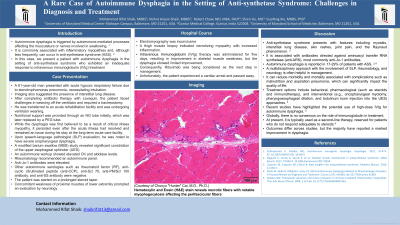Monday Poster Session
Category: Esophagus
P1869 - A Rare Case of Autoimmune Dysphagia in the Setting of Antisynthetase Syndrome: Challenges in Diagnosis and Treatment
Monday, October 23, 2023
10:30 AM - 4:15 PM PT
Location: Exhibit Hall

Has Audio
- MS
Mohammed Rifat Shaik, MBBS
University of Maryland Medical Center Midtown Campus
Baltimore, MD
Presenting Author(s)
Mohammed Rifat Shaik, MBBS1, Nishat Anjum Shaik, MBBS1, Robert Chow, MD, MBA1, Shien Hu, MD2, Guofeng Xie, MBBS, PhD2
1University of Maryland Medical Center Midtown Campus, Baltimore, MD; 2University of Maryland School of Medicine, Baltimore, MD
Introduction: Autoimmune dysphagia is triggered by autoimmune-mediated processes affecting the musculature or nerves involved in swallowing. It is commonly associated with inflammatory myopathies and, although less frequently, can occur in antisynthetase syndrome (ASS). In this case, we present a patient with autoimmune dysphagia in the setting of ASS who exhibited an inadequate response to intravenous immunoglobulin (IVIg) treatment.
Case Description/Methods: A 61-year-old man presented with acute hypoxic respiratory failure due to stenotrophomonas pneumonia, necessitating intubation. Imaging also suggested the presence of interstitial lung disease. After completing antibiotic therapy with Levaquin, the patient faced challenges in weaning off the ventilator and required a tracheostomy. Nutritional support was provided through an NG tube initially, which was later replaced by a PEG tube. Upon speech-language pathologist (SLP) evaluation, he was noted to have severe oropharyngeal dysphagia. A modified barium swallow (MBS) study revealed significant constriction of the upper esophageal sphincter (UES). An autoimmune workup showed elevated aldolase levels and positive anti-Jo-1 antibodies. Other autoimmune serologies such as rheumatoid factor (RF), anti-cyclic citrullinated peptide (anti-CCP), anti-Scl 70, anti-PM/Scl 100 antibody, and anti-SS antibody were negative.
The patient was started on a prolonged steroid taper. Electromyography was inconclusive, but a thigh muscle biopsy indicated necrotizing myopathy with increased inflammation. IVIg therapy was administered for five days, resulting in improvement in skeletal muscle weakness, but the dysphagia showed limited improvement. Consequently, Rituximab was being considered as the next step in management. Unfortunately, the patient experienced a cardiac arrest and passed away.
Discussion: Autoimmune dysphagia is reported in 17-29% of patients with ASS. Treatment options include behavioral, pharmacological (such as steroids and immunotherapy), and interventional (e.g., cricopharyngeal myotomy, pharyngoesophageal dilation, and botulinum toxin injection into the UES) approaches. IVIg has shown benefit, with clinical trials demonstrating subjective improvement in dysphagia and decrease in Visual Analog Scale (VAS) scores. A multidisciplinary approach is essential to reduce morbidity and mortality associated with complications such as malnutrition and aspiration pneumonia, which can significantly impact the quality of life.
Disclosures:
Mohammed Rifat Shaik, MBBS1, Nishat Anjum Shaik, MBBS1, Robert Chow, MD, MBA1, Shien Hu, MD2, Guofeng Xie, MBBS, PhD2. P1869 - A Rare Case of Autoimmune Dysphagia in the Setting of Antisynthetase Syndrome: Challenges in Diagnosis and Treatment, ACG 2023 Annual Scientific Meeting Abstracts. Vancouver, BC, Canada: American College of Gastroenterology.
1University of Maryland Medical Center Midtown Campus, Baltimore, MD; 2University of Maryland School of Medicine, Baltimore, MD
Introduction: Autoimmune dysphagia is triggered by autoimmune-mediated processes affecting the musculature or nerves involved in swallowing. It is commonly associated with inflammatory myopathies and, although less frequently, can occur in antisynthetase syndrome (ASS). In this case, we present a patient with autoimmune dysphagia in the setting of ASS who exhibited an inadequate response to intravenous immunoglobulin (IVIg) treatment.
Case Description/Methods: A 61-year-old man presented with acute hypoxic respiratory failure due to stenotrophomonas pneumonia, necessitating intubation. Imaging also suggested the presence of interstitial lung disease. After completing antibiotic therapy with Levaquin, the patient faced challenges in weaning off the ventilator and required a tracheostomy. Nutritional support was provided through an NG tube initially, which was later replaced by a PEG tube. Upon speech-language pathologist (SLP) evaluation, he was noted to have severe oropharyngeal dysphagia. A modified barium swallow (MBS) study revealed significant constriction of the upper esophageal sphincter (UES). An autoimmune workup showed elevated aldolase levels and positive anti-Jo-1 antibodies. Other autoimmune serologies such as rheumatoid factor (RF), anti-cyclic citrullinated peptide (anti-CCP), anti-Scl 70, anti-PM/Scl 100 antibody, and anti-SS antibody were negative.
The patient was started on a prolonged steroid taper. Electromyography was inconclusive, but a thigh muscle biopsy indicated necrotizing myopathy with increased inflammation. IVIg therapy was administered for five days, resulting in improvement in skeletal muscle weakness, but the dysphagia showed limited improvement. Consequently, Rituximab was being considered as the next step in management. Unfortunately, the patient experienced a cardiac arrest and passed away.
Discussion: Autoimmune dysphagia is reported in 17-29% of patients with ASS. Treatment options include behavioral, pharmacological (such as steroids and immunotherapy), and interventional (e.g., cricopharyngeal myotomy, pharyngoesophageal dilation, and botulinum toxin injection into the UES) approaches. IVIg has shown benefit, with clinical trials demonstrating subjective improvement in dysphagia and decrease in Visual Analog Scale (VAS) scores. A multidisciplinary approach is essential to reduce morbidity and mortality associated with complications such as malnutrition and aspiration pneumonia, which can significantly impact the quality of life.
Disclosures:
Mohammed Rifat Shaik indicated no relevant financial relationships.
Nishat Anjum Shaik indicated no relevant financial relationships.
Robert Chow indicated no relevant financial relationships.
Shien Hu indicated no relevant financial relationships.
Guofeng Xie indicated no relevant financial relationships.
Mohammed Rifat Shaik, MBBS1, Nishat Anjum Shaik, MBBS1, Robert Chow, MD, MBA1, Shien Hu, MD2, Guofeng Xie, MBBS, PhD2. P1869 - A Rare Case of Autoimmune Dysphagia in the Setting of Antisynthetase Syndrome: Challenges in Diagnosis and Treatment, ACG 2023 Annual Scientific Meeting Abstracts. Vancouver, BC, Canada: American College of Gastroenterology.
